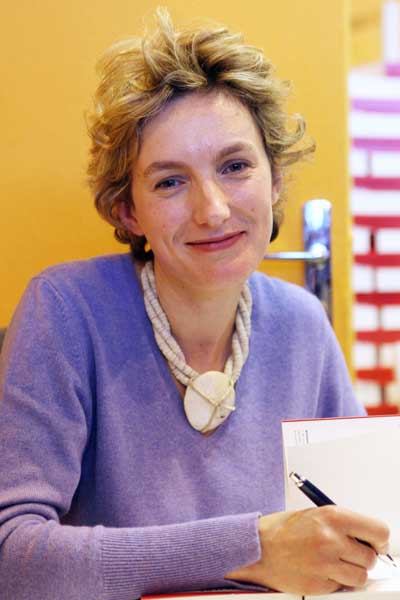Consolation, By Anna Gavalda trans Alison Anderson

Consolation follows the classic narrative arc of a principal character being jolted from the callow irresponsibility of youth through a wiser period of guilt to eventual redemption. Despite an awkward start, it makes an uncomplicated, easily digestible, cheering read; so it's perhaps unsurprising that it became the best-selling French novel of 2008, moving over half a million copies and being translated into 32 languages. This achievement puts Anna Gavalda alongside well-established writers like Fred Vargas, whose compounding sequence of taut procedurals and thrillers has earned her a loyal reputation.
Gavalda's success has enjoyed a similar steady growth. After widespread rejection, her debut collection of stories about love, penned while she was still a French schoolteacher, was published in 1999 by a small house. It became a word-of-mouth phenomenon, selling almost a million copies. Its English title (I Wish Someone Were Waiting For Me Somewhere) amply defines the themes and tone of Gavalda's work: love, loss, regret, yearning and hope.
A follow-up novella in 2002, Someone I Loved, fuelled by the failure of her own marriage, built on these foundations. The main characters in Consolation are bound with similar liens of bereavement, divorce and new love.
The 47-year-old Charles Balanda, a successful Parisian architect, leads a stressful life. Domestic relations with his urbanely unfaithful partner Laurence are strained – partly by his habit of shying away from emotional confrontation, but also by his frequent trips to Moscow where he is mired in managing a tricky building project.
Charles tries hard with a spiky teenage daughter whom he has raised as his own; but his aloof parents and snooty sisters add little warmth to the family circle. When stark news reaches him of the death of Anouk, the inspiring single mother of a childhood friend, Charles tips into crisis.
There is little complexity to Gavalda's plot (grieving man unravels – is healed by new love) but her characters, assembled with care and compassion, keep up the steady lollop of this long but far from heavy novel. Anouk is an affecting creation: beautiful (intoxicatingly so to a pubescent lad), generous, determined but financially and (more importantly) emotionally needy after her feckless partner vanishes as soon as their son Alexis is born. Both Charles and Alexis vie for her attention while revelling in the eccentricities of their childminder – a bereft cabaret queen whom Anouk adopted during her work as an A&E nurse.
Emotional rivalry, heroin, alcohol and the inarticulate turmoil of youth cause both boys to abandon Anouk, which shaming regret lies at the heart of Charles's guilty derangement. Seeking closure, he looks for Alexis but happens upon a woman who circumstantially resembles Anouk. Following the death of her sister in a car crash, Kate sacrificed her US research post to live in a ramshackle farm in the same village as Alexis in order to care for her sister's orphaned children and animals.
This encounter marks a distinct stylistic shift. The reader has to take on the chin the improbably instant mutual attraction springing up between Kate and Charles, and it's almost disarming that Gavalda pays so little mind to the irritant of narrative plausibility. What follows is a hundred-page slab of explication as Kate, like a scruffily sexy ancient mariner, regales Charles with the privations of her hand-to-mouth proxy motherhood. Far from being mawkish, Kate's confession clips along with an affecting sentimentality. Buoyed up by slyly flirtatious jokes and sophisticated linguistic riffs (cleverly sustained in Alison Anderson's fluid English translation), the art of her story-telling operates as a healing unguent.
This lengthy testimonial suffuses the remainder of the novel with an anticipation of well-being that is gradually delivered; welcome relief after the over-written anxiety of the novel's off-putting opening quarter. Deliberate opacities, self-conscious phrases and a litter of archly portentous comments may give a clumsy textual mimicry to Charles's growing distress, but they also congest the narrative with a mildly hysterical tone.
The fluency of the bulk of Consolation is a consolation in itself, and probably sufficient evidence as to why Gavalda's mournfully seductive romantic fictions, two of them now filmed with world-class actors such as Audrey Tautou and Daniel Auteuil, have acquired such a huge following.
Join our commenting forum
Join thought-provoking conversations, follow other Independent readers and see their replies
Comments